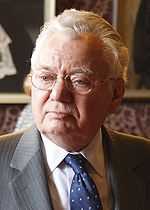Thomas Buergenthal
| Thomas Buergenthal | |
|---|---|
 | |
| Judge of the International Court of Justice | |
| In office 2 March 2000 – 6 September 2010 | |
| Personal details | |
| Born | 11 May 1934 Ľubochňa, Czechoslovakia |
| Alma mater | Bethany College (B.A.) New York University School of Law (J.D.) Harvard Law School (LL.M., S.J.D) |
Thomas Buergenthal (born 11 May 1934, in Ľubochňa, Czechoslovakia, today Slovakia) is a former judge of the International Court of Justice. He resigned his post as of 6 September 2010.[1] Buergenthal is returning to his position as Lobingier Professor of Comparative Law and Jurisprudence at The George Washington University Law School.[2]
Biography
Thomas Buergenthal, born to German-Jewish/Polish-Jewish parents who had moved from Germany to Czechoslovakia in 1933, grew up in the Jewish ghetto of Kielce (Poland) and later in the concentration camps at Auschwitz and Sachsenhausen. After the War he lived with his mother in Göttingen.
On 4 December 1951, he emigrated from Germany to the United States. He studied at Bethany College in West Virginia (graduated 1957), and received his J.D. at New York University Law School in 1960, and his LL.M. and S.J.D. degrees in international law from Harvard Law School. Judge Buergenthal is the recipient of numerous honorary degrees.
Buergenthal is a specialist in international law and human rights law.
Buergenthal served as a judge on the International Court of Justice at The Hague from March 2000 to his resignation in September 2010. Prior to his election to the International Court of Justice, he was the Lobingier Professor of Comparative Law and Jurisprudence at The George Washington University Law School. He was Dean of Washington College of Law of American University from 1980 to 1985, and held endowed professorships at the University of Texas and Emory University. Buergenthal served as a judge for many years, including lengthy periods on various specialized international bodies. Between 1979 and 1991, he served as a judge of the Inter-American Court of Human Rights, including a term as that court's president; from 1989 to 1994, he was a judge on the Inter-American Development Bank's Administrative Tribunal; in 1992 and 1993, he served on the United Nations Truth Commission for El Salvador; and from 1995 to 1999, he was a member of the United Nations Human Rights Committee.
Buergenthal is the author of more than a dozen books and a large number of articles on international law, human rights and comparative law subjects. He is member of a number of editorial boards of law journals, including the American Journal of International Law.
Judge Buergenthal is a co-recipient of the 2008 Gruber Prize for Justice for his contributions to the promotion and protection of human rights in different parts of the world, and particularly in Latin America.[3]
His memoir, A Lucky Child, which describes his experience in various German concentration camps, has been translated into more than a dozen languages.
Selected works
- Law-Making in the International Civil Aviation Organization (1969)
- International Protection of Human Rights (with L. B. Sohn, 1973)
- Public International Law in a Nutshell (4th edition 2007, with S.D. Murphy)
- International Human Rights in a Nutshell (3rd edition 2002, with D. Shelton and D. Stewart)
- Protecting Human Rights in the Americas (4th edition 1995, with D. Shelton)
- A Lucky Child (2009)[4]
Lectures
A Brief History of International Human Rights Law in the Lecture Series of the United Nations Audiovisual Library of International Law
"The Lawmaking Role of International Tribunals," Dean Fred F. Herzog Memorial Lecture, October 17, 2011, The John Marshall Law School, Chicago, Illinois.[5]
References
- ↑ United Nations Security Council Resolution 1926 S-RES-1926(2010) in 2010 (retrieved 2010-06-02)
- ↑ An Advocate For All
- ↑ 2008 Gruber Justice Prize
- ↑ Thomas Buergenthal (2007). A Lucky Child. Little Brown. pp. 1–228. ISBN 978-1-61523-720-3.
- ↑ Program for the Fred F. Herzog Memorial Lecture (Oct. 17, 2011).